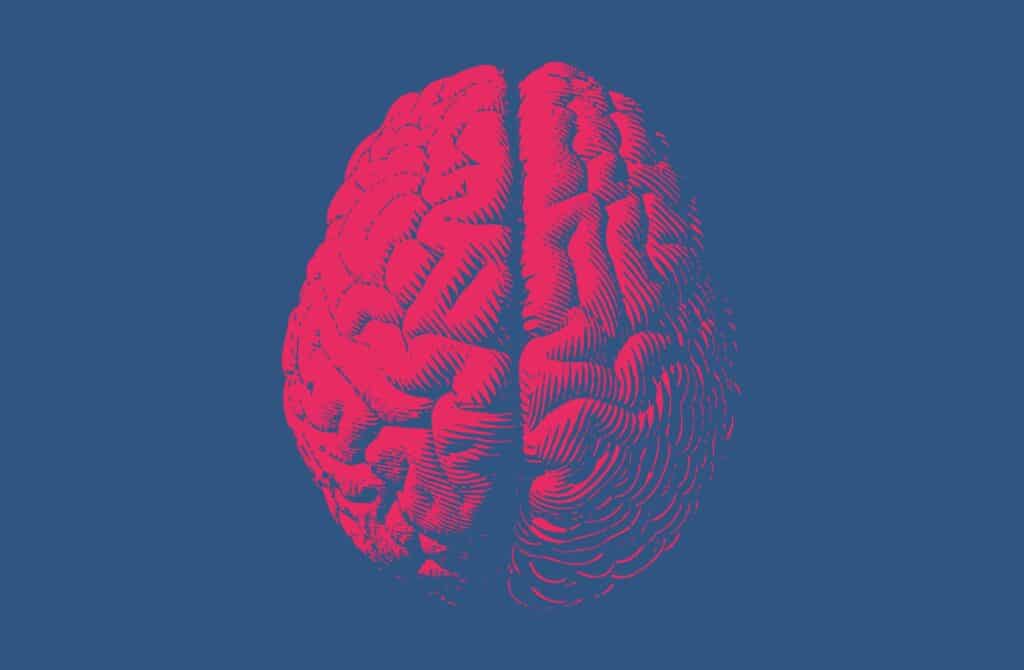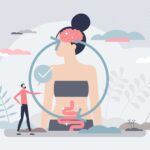Blog

What is the connection between IBS and eating disorders?
When you think about conditions that commonly co-occur, eating disorders and Irritable Bowel Syndrome (IBS) may not be the first ones that come to mind. But they’re more interconnected than you might think!
Studies have found that between 50% to 70% of eating disorder patients also suffer from IBS.1-3 In fact, the gut symptoms experienced in an eating disorder can be so severe that they are commonly misdiagnosed as IBS.4 Additionally, between 5% and 45% of people who experience gastrointestinal disorders (such as IBS) report disordered eating habits.5
This association makes sense when you think about some of the similarities between the two conditions. For example, both IBS and eating disorders:
- Disproportionately affect women.
- Are linked to chronically high anxiety.1,6
- Involve food-related stress.
- May involve dietary restriction.
- Cause gastrointestinal symptoms.
These two conditions can contribute to the development and worsening of one another.
At the moment, it’s unclear whether IBS leads to the eating disorder or vice versa – it’s something of a chicken-or-egg scenario! This being said, one study of IBS and eating disorder sufferers found that almost 90% of participants developed their eating disorder first.6
How can IBS symptoms lead to eating disorder behaviours?
THE GUT-BRAIN AXIS
A major factor in the relationship between IBS and eating disorders is the gut-brain axis.
This connection between the brain and the digestive system can create an ongoing cycle wherein gut symptoms cause anxiety and food-related stress, which in turn worsen said gut symptoms, and so on.
Eating disorder behaviours related to a fear of IBS symptoms might look like:
- Total avoidance of eating.
- Restriction of entire food groups.
- A poor relationship with food.
- Stress and anxiety related to eating.
THE GUT MICROBIOME
Elimination diets for IBS, such as the low FODMAP diet, can have a detrimental effect on the gut microbiome, which is an ecosystem of good and bad bacteria. This occurs as a result of inadvertently restricting foods rich in prebiotics and probiotics, which are beneficial to the gut microbiota.
*NOTE – prebiotics are a type of fibre and probiotics are live bacteria found in fermentable foods like yoghurt and kombucha.
An altered gut microbiome has been shown to negatively impact mental health, which is at least partially due to the gut-brain axis.7 Although the research is still in its early stages, it has also been suggested that an altered gut microbiome may contribute to the development of eating disorders, specifically anorexia nervosa.8
When you consider the link between the gut and the brain, it’s not surprising that a physical disorder has the potential to trigger a mental disorder!
How can eating disorder behaviours lead to IBS symptoms?
RESTRICTION
Extended restriction of food intake can have severe physical repercussions, including the atrophy or weakening of the digestive muscles. This can lead to gastroparesis (delayed emptying of the stomach contents), which causes gut symptoms like constipation, bloating and distention, and abdominal pain. Research has found that the development of gastroparesis can significantly extend the duration of an eating disorder and the severity of malnutrition.9
As mentioned above, the elimination of foods containing prebiotics and probiotics can negatively impact the gut microbiome. This not only occurs in the low FODMAP diet for IBS but also in restrictive low-carbohydrate diets commonly seen in eating disorder patients.10 Not only are fibre-rich carbohydrate foods vital to the management of existent IBS symptoms (think bowel habits!) but an altered gut microbiome can cause low-grade inflammation in the gut, increasing the risk of developing IBS in the future.10,11
PURGING
Self-induced vomiting is a common eating disorder behaviour which can lead to a variety of issues due to the high acidity of the stomach contents. Repeated vomiting can lead to complications in the digestive system such as gastritis (inflammation of the stomach lining) and oesophagitis (inflammation of the oesophagus). Gut symptoms of these two conditions include pain, gas, nausea and vomiting.
Laxative abuse is another common method of purging. Long term misuse can lead to damage to the nerves and muscles in the gut, which can cause bloating, pain and chronic constipation.
Lastly, strenuous exercise is frequently used to compensate for calories consumed and can cause nausea and diarrhoea – you may have experienced this phenomenon first-hand if you’re a runner!
BINGE EATING
Irregular eating habits and the consumption of extremely large volumes of food in a short time period can cause gut symptoms like gas, bloating and diarrhoea. Furthermore, a period of restriction followed by a bingeing episode can increase the risk of acute gastric dilation (extreme abdominal distension) as a result of decreased gastric motility, increased gastric capacity and delayed gastric emptying.9 Symptoms include nausea and vomiting, bloating and abdominal pain.
This may seem like a blog post that is just full of bad news but we promise that there is bright side!
It’s this: recovery from an eating disorder is possible and most related gut symptoms will resolve when eating is normalised.
In the meantime, gastrointestinal discomfort can be eased by:
- Focusing on consistency of eating (small frequent meals)
- Attempt to include foods from all food groups
- Minimising stress around mealtimes
- Reducing compensatory behaviours
- Medication use (under the supervision of your GP)
At Embody Health London, we understand how your relationship with food can influence your health in so many different ways. That’s why we want to help you to restore that intuitive relationship between food and your body, whether you’re experiencing IBS, an eating disorder, or something completely different. To make an appointment with one of our dietitians, get in touch at [email protected].
Karli Battaglia MDiet, APD
EHL Team x
References
- Boyd C, Abraham S, Kellow J. Psychological features are important predictors of functional gastrointestinal disorders in patients with eating disorders. Scandinavian Journal of Gastroenterology. 2005;40(8):929-935.
- Perkins S, Keville S, Schmidt U, Chalder T. Eating disorders and irritable bowel syndrome: is there a link?. Journal of Psychosomatic Research. 2005;59(2):57-64.
- DeJong H, Perkins S, Grover M, Schmidt U. The prevalence of irritable bowel syndrome in outpatients with bulimia nervosa. International Journal of Eating Disorders. 2011;44(7):661-664.
- Ogg E, Millar H, Pusztai E, Thom A. General practice consultation patterns preceding diagnosis of eating disorders. International Journal of Eating Disorders. 1997;22(1):89-93.
- Satherley R, Howard R, Higgs S. Disordered eating practices in gastrointestinal disorders. Appetite. 2015;84:240-250.
- Perkins S, Keville S, Schmidt U, Chalder T. Eating disorders and irritable bowel syndrome: is there a link?. Journal of Psychosomatic Research. 2005;59(2):57-64.
- Dash S, Clarke G, Berk M, Jacka F. The gut microbiome and diet in psychiatry. Current Opinion in Psychiatry. 2015;28(1):1-6.
- Kleiman S, Carroll I, Tarantino L, Bulik C. Gut feelings: A role for the intestinal microbiota in anorexia nervosa?. International Journal of Eating Disorders. 2015;48(5):449-451.
- Norris M, Harrison M, Isserlin L, Robinson A, Feder S, Sampson M. Gastrointestinal complications associated with anorexia nervosa: A systematic review. International Journal of Eating Disorders. 2015;49(3):216-237.
- Heiman M, Greenway F. A healthy gastrointestinal microbiome is dependent on dietary diversity. Molecular Metabolism. 2016;5(5):317-320.
- Chong P, Chin V, Looi C, Wong W, Madhavan P, Yong V. The Microbiome and Irritable Bowel Syndrome – A Review on the Pathophysiology, Current Research and Future Therapy. Frontiers in Microbiology. 2019;10.
- Menees S, Chey W. The gut microbiome and irritable bowel syndrome. F1000Research. 2018;7:1029.














